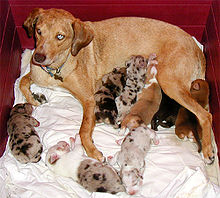- Dog breeding
-
Dog breeding is the practice of mating selected specimens with the intent to maintain or produce specific qualities and characteristics.
Dogs reproduce without human interference, so their offsprings' characteristics are determined by natural selection. Domestic dogs may be intentionally bred by their owners. [1] A person who intentionally mates dogs to produce puppies is referred to as a dog breeder. Breeding relies on the science of genetics, so the breeder with a knowledge of canine genetics, health, and the intended use for the dogs attempts to breed suitable dogs.
Contents
History
Humans have maintained populations of useful animals around their places of habitat since pre-historic times.[2] They have intentionally fed dogs considered useful, while neglecting or killing others, thereby establishing a relationship between humans and certain types of dog over thousands of years. Over these millennia, domesticated dogs have developed into distinct types, or groups, such as livestock guardian dogs, hunting dogs, and sighthounds. To maintain these distinctions, humans have intentionally mated dogs with certain characteristics to encourage those characteristics in the offspring.
Through this process, hundreds of dog breeds have been developed. Initially, the ownership of working and, later, purebred dogs, was a privilege of the wealthy. Nowadays, many people can afford to buy a dog. Some breeders chose to breed purebred dogs, while some prefer to produce crossbred dogs, claiming that the outcross is healthier than original breeds, and avoiding linebreeding or inbreeding.
Registries
Breeders may report the birth of a litter of puppies to a dog registry, such as kennel club to record it in stud books such as those kept by the AKC (American Kennel Club). Such registries maintain records of dogs’ lineage and are usually affiliated with kennel clubs.[3] Maintaining correct data is important for purebred dog breeding. Access to records allows a breeder to analyze the pedigrees and anticipate traits and behaviors. Requirements for the breeding of registered purebreds vary between breeds, countries, kennel clubs and registries. Breeders have to abide the rules of the specific organization to participate in its breed maintenance and development programs. The rules may apply to the health of the dogs, such as joint x-rays, hip certifications, and eye examinations; to working qualities, such as passing a special test or achieving at a trial; to general conformation, such as evaluation of a dog by a breed expert. However, many registries, particularly those in North America, are not policing agencies that exclude dogs of poor quality or health. Their main function is simply to register puppies born of parents who are themselves registered.
Criticism
The term ‘backyard breeders’ is commonly used in Canada and the U.S. to describe a breeder with a lack of knowledge and experience; while the term ‘puppy mills’ or ‘puppy farms’ refers to businesses that mass produce puppies of different breeds. Animal rights activists claim that breeding dogs in order to sell them is unethical, attacking breeders whom they believe are more concerned with profit than the animals' welfare.
Critics cite breed registries for encouraging the inbreeding of dogs thereby contributing to a proliferation of genetic disorders.
Genetic defects
Some dogs have certain inheritable characteristics that can develop into a disability or disease. Excessive wear of hip joint or bone, known as hip dysplasia is one such condition. As well, some eye abnormalities, heart conditions, deafness, are proven to be inherited.[4]
There have been extensive studies [5] of these conditions, commonly sponsored by breed clubs and dog registries, while breed clubs provide information of common genetic defects for according breed. As well, special organizations, such as Orthopedic Foundation for Animals, collect data and provide it to breeders, as well as to the general public.
Some registries, such as American Kennel Club include records of absence of certain genetic defects, known as certification, into dog’s individual records. For example, the German Shepherd National Breed Club in Germany is a registry that recognizes that hip dysplasia is a genetic defect for the dogs of this breed. Accordingly, it requires all dogs to pass evaluation for absence of Hip Dysplasia in order to register their progeny, and records the results in individual dog‘s pedigrees.
References
- ^ Seranne, Ann (1980). The Joy of Breeding Your Own Show Dog. New York, N.Y: Howell Book House. ISBN 0-87605-413-0.
- ^ Darwin, Charles (2004). The Variation of Animals And Plants Under Domestication. Kessinger Publishing. ISBN 1-4191-8660-4.
- ^ American Kennel club Staff (1997). The complete dog book. New York, N.Y: Howell Book House. ISBN 0-87605-047-X.
- ^ George A. Padgett (1998). Control of Canine Genetic Diseases (Howell Reference Books). New York, N.Y: Howell Book House. ISBN 0-87605-004-6.
- ^ University of PA Section of Medical Genetics PennGen
External links
- Extent of inbreeding in pedigree dogs revealed in new study Imperial College London
- Flaws on paws - Welfare problems in breeding pedigree dogs New Scientist
- Designer animals or breeding for welfare? (video) - British Veterinary Association Animal Welfare Foundation
Dogs Training Behavior Health Types List of types · Bandogs · Eskimo dogs · Companion dog · Curs · Fighting dogs · Guard dogs · Herding dogs · Hounds · Hunting dogs · Bird dogs · Gun dogs · Lap dogs · Livestock guardian dogs · Mountain dog · Pointers · Retrievers · Setters · Primitive dogs · Scenthounds · Sighthounds · Sled dogs · Terriers · Turnspit dogs · Water dogsBreeds List of breeds · List of dog hybrids (crossbreeds) · Breed Groups · Ancient breeds · Conformation · Breeding · Crossbred (hybrid) · Mixed-breed (Mutt) · Origin · Purebred · Rare breedsWork Human–dog
interactionAnimal testing · Baiting · Breed-specific legislation · Communication · Dog park · Dog sports · Dog walking · Dog daycare · Dog grooming · Intelligence · Therapy · Training · Fear of dogs · Dog license · Dog food · Dogs in religionCategory · Portal · Book Categories:
Wikimedia Foundation. 2010.

